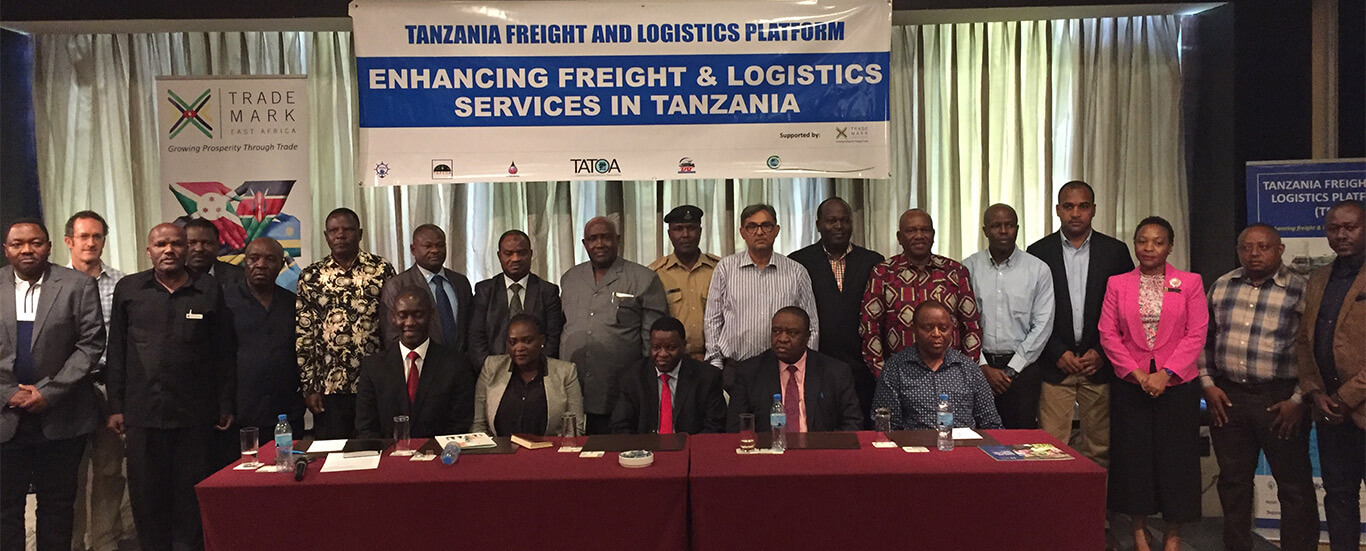- Tanzania’s demand for domestic transport is expected to increase by 16% in 2020
- Dar es Salaam port throughput has increased from 7.4 million tons in 2007 to 14.26 million tons in 2014 with 18 million tons targeted for 2015/6
- Logistics Performance Index for Tanzania shows a dramatic drop of 40 places while a survey by the Shippers Council of East Africa shows an increase in the cost of transit on the Central Corridor, as compared to a significant drop in costs on the Northern Corridor
Dar es Salaam – November 25th, 2016 – Stakeholders in the freight and logistics industry have today launched a national platform that is expected to bring together policy makers and industry stakeholders to collectively tackle the challenges of the logistics and freight industry. The National Platform is further intended to foster best practices, play a critical role in the logistics sector, that will allow players to innovate, add value and strategize in order to realize the common objective of making the logistics and freight industry more efficient, sustainable, and innovative and ultimately increase the country’s competitiveness in order to secure economic growth and alleviate poverty.
TradeMark Africa has committed to supporting the operations of the platform through a US$400k grant support to the Tanzania Private Sector Federation (TPSF) which will be hosting the platform. TPSF will organise other relevant freight and logistics players to influence major reforms in operational reforms in Tanzania.
Chief Guest Professor Faustin Kamuzora, Permanent Secretary, Ministry of Transport, Works, Communication and Technology
“The government is keen to engage with the industry in developing the freight and logistics sector. Maintaining and strengthening the position of Tanzania as a destination of choice for other land locked countries will require Tanzania to have the right policy framework and make the right choices as alternative routes progressively improve in terms of security and costs. The government will offer its full support to the platform to ensure the efficiency of freight and logistics services in Tanzania is achieved”.
Tanzania’s demand for domestic transport is expected to increase by 16% in 2020. Dar es Salaam port throughput has increased from 7.4 million tons in 2007 to 14.26 million tons in 2014. The target for 2015/16 has been set at 18 million tons (BRN) with, however, declining actual figures reported in the third and fourth quarters of 2015/16. Dar port is also an important transit point for many African nations granting access to maritime travel and trade through the Indian Ocean. The country is poised to achieve between 7% and 8% GDP growth over the next few years. In 2012, fourteen (14) percent of the imports and exports of Tanzania’s landlocked neighbouring countries experiencing a GDP growth averaging 7% passed through the Dar Port. This is expected to grow further as the region undergoes economic expansion.
“Currently East Africa’s trade corridors are characterised by long transit times and high costs. Freight costs per kilometre are more than 50% higher than costs in the United States and Europe, and for the landlocked countries, transport costs can be as high as 45% of the value of exports. This platform is aimed at addressing these challenges and improving the region’s competitiveness,” said John Ulanga, Country Director, TradeMark Africa, Tanzania.
The Platform is also expected to deal with logistics inefficiencies, delays in the movement of goods and services, challenges in implementation of national and regional logistics policies, and harmonization of documentation requirements by customs in the country. Other challenges the Platform will address are related to effective advocacy on security of goods and personnel, simplifying customs procedures and avoiding delays. The focus will have to be on intensive advocacy especially on customs delays, corruption and extortion and inconsistent freight rates, etc
Organisations subscribing to the platform include:
- Transporters Association of Tanzania (TAT);
- Tanzania Truck Owners Association (TATOA);
- Tanzania Shipping Agents Association (TASAA);
- Containers and Inland Depots Association of Tanzania (CIDAT);
- Tanzania Freight Forwarders Association (TAFFA);
- Tanzania Petrol Station Owners Association (TAPSOA);
- Tanzania Association of Oil Marketing Companies (TAOMAC);
- Tanzania Cargo Consolidators Association (TACCA);
- Tanzania Bus Owners Association (TABOA);
- Tanzania Ports Service Operators (TAPSO);
- Tanzania Shippers Council (TCS)
This platform will also address other obstacles faced by freight and logistics sectors including: highlighting and advocating for issues affecting the sector; strengthening capacity of the platform and; increasing awareness of standard operating procedures for truck drivers and clearing firms.
TradeMark Africa (TMA) is an aid-for-trade organisation that was established with the aim of growing prosperity in East Africa through increased trade. TradeMark Africa (TMA) operates on a not-for-profit basis and is funded by the development agencies of the following countries: Belgium, Canada, Denmark, Finland, the Netherlands, UK, and USA. TradeMark Africa (TMA) works closely with East African Community (EAC) institutions, national governments, the private sector and civil society organisations.















